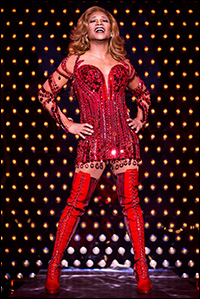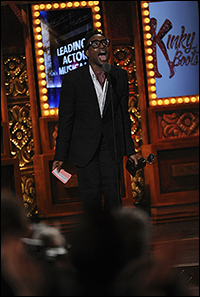
The new musical by Tony Award winners Cyndi Lauper (music and lyrics), Harvey Fierstein (book) and director-choreographer Jerry Mitchell centers on the relationship between two unlikely business partners: a London drag queen (played by Porter) and a Northampton businessman attempting to save his livelihood (played by Stark Sands).
For the stage, Fierstein has also given Lola (Porter) and Charlie (Sands) moments where they reflect on their younger selves and the men they've become and hope to be.
Porter took a look back at his younger self in this feature with Playbill.com, where he reconnects with some of the cast albums that first introduced him to Broadway and to that young boy who checked out the cast album of Sunday in the Park With George at the Carnegie Library.
Tell me about your initial connection to Broadway as a kid growing up in Pittsburgh.
Billy Porter: The Carnegie Library was the outlet, and the place for me, pre-Internet, to go and learn about this magical wonderland that was called Broadway. It was all I had; it was my only connection. So when I did my first show in middle school, one of my teachers said, "You know you can go to the Carnegie Library and they have a whole slew of cast albums you can browse." I would go check them out, five, ten at a time, and keep them for a couple of weeks and listen to the cast albums as I did my homework. I would study the names and the cast lists and the designers. It was so funny because I had this game with a good friend of mine. Basically, it was like Six Degrees of Kevin Bacon. So we'd play this game – we didn't name it – but it was Six Degrees of Musical Theatre! [Laughs.] If you wanted to connect Sunday in the Park With George with Gypsy, how would you do that? You could use people, you could use actors, you could use designers, you could use the creative team. Whoever could connect the two shows the quickest won the round. I learned a lot of people that way. Otts Munderloh was the big sound designer at the time. He worked on everything. So Otts Munderloh was like a trump card! [Laughs]. I was a real true musical theatre geek before it was easy to be that.
| |
 |
|
| Porter in Kinky Boots. | ||
| photo by Matthew Murphy |
BP: The Wiz, A Chorus Line, Gypsy, Dreamgirls and Sunday in the Park With George.
What was your connection to Sunday?
BP: The depth of and the intricacy of the music in Sunday – it's interesting because the way that you hear Sunday on my album ["At the Corner of Broadway and Soul"] is the way that I heard it in my head when I was listening to the original cast recording. It was already coming in through that lens to me, which I think is really interesting. You wouldn't look at me and think I would be the poster boy for [Stephen] Sondheim, which is what I think is so interesting about my connection to that music and his work. It just really spoke to me. I think the complexity of the emotional journey that the people in all of his shows take, and the hard questions that a lot of his shows ask of us resonated with me a lot. And it was actually a librarian who introduced me, because he knew I'd take lots of albums out and he said, "This is the only one you'll need this week."
Did you find a strong connection to black performers in musicals like The Wiz and Dreamgirls?
BP: Yeah, the first show I did was in the sixth grade. I did Babes in Arms. I didn't quite understand where I would fit in. It was fun, but it wasn't something I thought I could do for a living. And then, like I said in my Tonys speech, I stumbled across the Tonys and I saw Dreamgirls on the Tony Awards and I was like, "Oh my God!" Prior to that, as my first show, my grandmother took me to see the touring company of The Wiz for my birthday, and Lillias White was actually in it. [Laughs.] Obviously, I didn't know her at the time. I sort of fell in love with it, but it was the fantasy of it. It didn’t really register that I could do it, and it was sort of six months later when I saw the Tonys and thought, "Oh, I can actually do this, like really do this."
| |
 |
|
| Porter accepts his Tony. | ||
| CBS |
BP: I was really lucky because I believe saw the first regional theatre production of A Chorus Line, which was at the Pittsburgh Playhouse. I want to say Lenora Nemetz was Cassie, Kathleen Marshall was Val and Rob Ashford was Paul! And I didn't know anything about A Chorus Line, and I went to see it and was like, "Oh My God!" I think the thing that I was relating to in these stories was the search for truth inside of one's art, which for me growing up in the Pentecostal church – it was a big deal that I wanted to be something that deviated from the life that I was supposed to be living. I think there was something in Dreamgirls, something in The Wiz – that search for your own truth, your own identity – even in Gypsy, your search for your own identity – Sunday In The Park with George - the search for the the art of it. Where do you find that? And how, if ever, are you satisfied with that journey?
Who was your first Mama Rose?
BP: Around my time it was Tyne Daly, but then I went back and pulled out all the other ones. [Laughs.]
You've spoken before about struggling to secure your place in show business as an actor. This year you're having such a huge success with Kinky Boots. Coming off the reviews and the Tony Award, is it difficult to stay present once the dream becomes real? BP: I try to force myself to be present enough to experience it and feel it. Because the work is so constant, sometimes you can get in a place where you don't pay attention. And this time around I was really paying attention, and it was fascinating to go through this whole thing being in a hit show, and watching the response, and watching people learn about the show, and grow with us. It's been an amazing experience, it really really has.
At the end of Kinky Boots Charlie and Lola have a moment to reconnect with their younger selves. I found it so moving. What would you say to that kid checking out cast albums in the Pittsburgh library if you could?
BP: If I could look back at my younger self, I would tell him that while the journey that you will have to take is going to be bumpy at times, just know that when you get to the other side, it's glorious. Because when you can truly live in the fullness and the truth of who you are, there's no better life. And sometimes that's hard to feel. I always say, "It's easy to be who you are when who you are is what's popular." I wasn't popular for a really long time. Being black and gay and Christian is not a popular thing. It's becoming more popular I suppose... With as difficult and challenging as the journey has been, I wouldn't change it for the world.
(Adam Hetrick is the editor in chief of Playbill.com. His work appears in the news, feature and video sections of Playbill.com, as well as in the pages of Playbill magazine. Follow him on Twitter @PlaybillAdamH).










